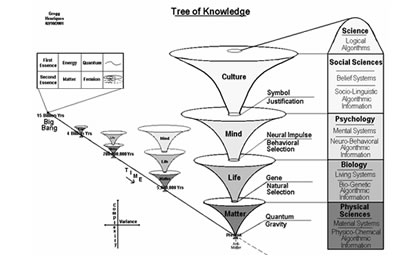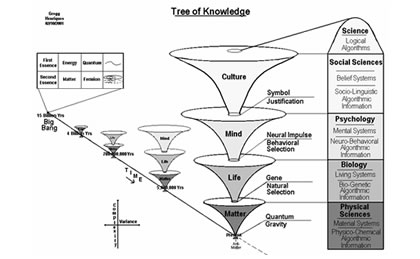While Sternberg & Grigorenko’s (2001) view is extremely attractive and practical, it is nevertheless a bottom-up approach that assumes that fixing the research process will also seal higher level theoretical fissures. Henriques’ (2003) contrasting, although not necessarily contradictory, view is that extra levels of explanation or insight are required to link together theoretical models from the top downwards. Henriques is not just aiming to unify psychology here, but also to unite the natural and social sciences. In his view, psychology provides just such a bridging point.
As part of his project, Henriques (2003) takes on the seemingly impossible task of reconciling Sigmund Freud with B. F. Skinner. How can this be done since Skinner famously rejected the study of mental states that was the basis of Freud’s work? Broadly, Henriques (2003) uses E. O. Wilson’s ideas about the unity of knowledge (consilience) to suggest a ‘Tree of Knowledge’ which locates the physical sciences like physics at the base and psychology above biology and below the social sciences.

The Tree of Knowledge (above) provides a way of integrating ideas from a number of different levels of complexity. Specifically, then, it sees Skinner’s theories as at a lower level of complexity from Freud who was operating on a more socio-cultural level. The problem, however, while recognising different levels of analysis, is in being able to make connections between them. This, Henriques (2003) argues, can be achieved by identifying and understanding the junction points between each of the levels.
It is the work of Skinner and Freud that provides the junction points. Skinner connects upwards from biology in to psychology and Freud connects upwards from psychology into culture. The papers on Henriques’ website describe the details of how this is achieved.
Henriques’ work is far from just theoretical though, he is a practicing clinical psychologist and his calls for unity have provoked considerable comment in two special issues of the Journal of Clinical Psychology.
Conclusion
Henriques’ ideas, along with those of Sternberg and Grigorenko have major implications for the practical application of psychology to real-world issues. All psychologists, whether academic or clinical, would benefit from reflecting on this discussion about unity in psychology. Instead of riding the round-a-bout of fashionable therapies or investigating and proposing ever more disconnected theories, it is worth considering how the interfaces between current knowledge can be strengthened.
 Henriques (2003) The tree of knowledge system and the theoretical unification of psychology (Abstract)
Henriques (2003) The tree of knowledge system and the theoretical unification of psychology (Abstract)
 Henriques’ Tree of Knowledge System website
Henriques’ Tree of Knowledge System website
 The Psychology Wiki’s page on the ToK system
The Psychology Wiki’s page on the ToK system
 Tree of Knowledge discussion list
Tree of Knowledge discussion list
 Read more PsyBlog posts on Unity in Psychology
Read more PsyBlog posts on Unity in Psychology

